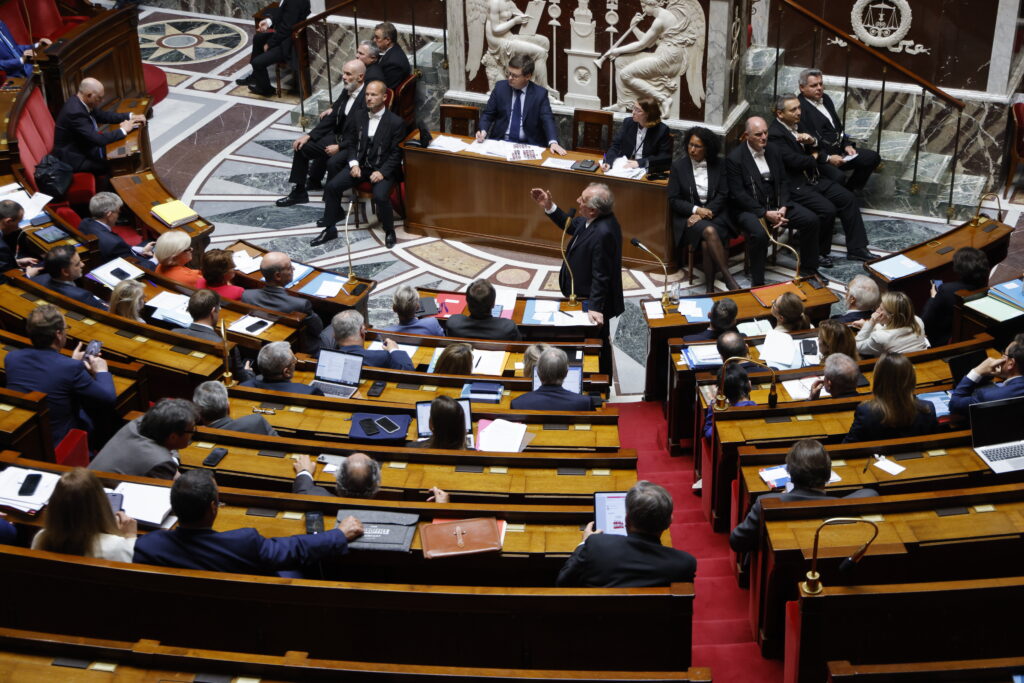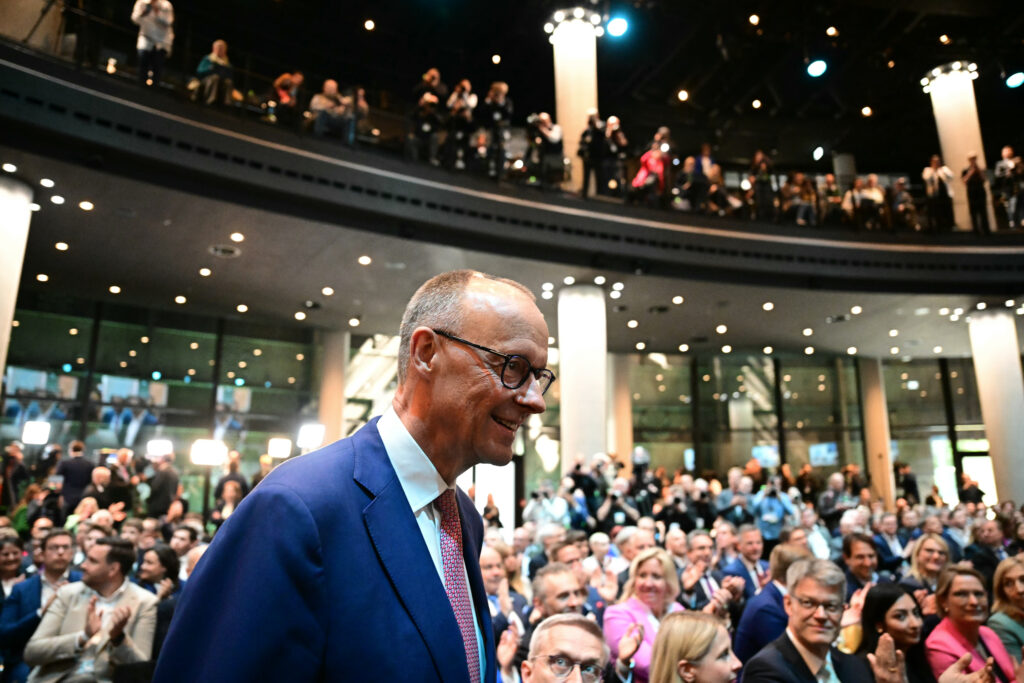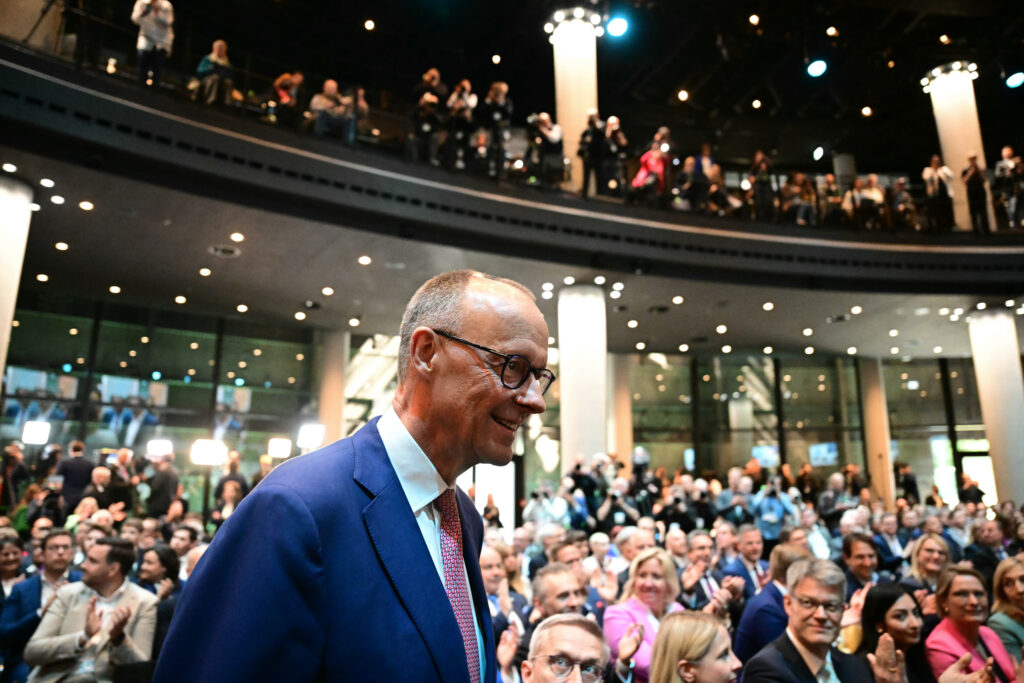Une loi contre l’antisémitisme dans l’Enseignement supérieur examinée à l’Assemblée
Une proposition de loi pour lutter contre l’antisémitisme dans l’enseignement supérieur, adoptée à l’unanimité au Sénat, sera examinée mardi à l’Assemblée nationale, avec des désaccords anticipés notamment entre divers groupes politiques sur les sanctions envisagées.Ce texte porté par Pierre Henriet (Horizons et Indépendants) et Constance Le Grip (Ensemble pour la République), entend mettre en place une “sensibilisation obligatoire” à la lutte contre l’antisémitisme et le racisme au sein des missions de formation des établissements.Il renforce les dispositifs de prévention et de signalement, en instaurant par exemple au sein des établissements des “référents” dédiés à la lutte contre le racisme et l’antisémitisme.Le texte d’origine prévoyait aussi dans son article 3, supprimé lors de son examen mercredi à la Commission des affaires culturelles et de l’éducation, la création d’une section disciplinaire commune aux établissements d’une même région académique pour “mutualiser” la charge disciplinaire entre établissements. Le co-rapporteur Pierre Henriet souhaite défendre mardi cette disposition initialement prévue et affirme que cela permettrait aux chefs d’établissements d’externaliser le processus disciplinaire sur les dossiers les plus sensibles.L’enjeu sera “d’essayer d’avoir le même esprit que celui des débats au Sénat même si ce sera plus compliqué à l’Assemblée”, soulignait-il lundi auprès de l’AFP.Il rappelle que “neuf étudiants sur dix disent avoir subi des actes antisémites à l’université” – selon un sondage de l’Union des étudiants juifs de France – avec une accélération depuis l’attaque sans précédent du Hamas en Israël, suivie d’une riposte sanglante à Gaza de l’armée israélienne.Marie Mesmeur, députée LFI et membre de la Commission sur les affaires culturelles et de l’éducation, dénonce quant à elle auprès de l’AFP des mesures “liberticides” de “la droite et de l’extrême droite” dans le texte de loi, faisant référence principalement à son article 3.”Je suis pour lutter contre l’antisémitisme, comme contre toutes les formes de racisme. Mais l’article 3″ avant d’être supprimé avançait des mesures “qui vont vers de la répression croissante, sans moyens supplémentaires pour l’université”, a-t-elle ajouté.En réponse aux amendements, le titre du texte s’intitule désormais “proposition de loi relative à la lutte contre l’antisémitisme, le racisme, les discriminations, les violences et la haine dans l’enseignement supérieur”.Le gouvernement a reçu il y a une semaine un rapport comportant des mesures contre l’antisémitisme, “déclinable” face aux autres formes de racisme, et qui insistait notamment sur la formation des personnels enseignants et des fonctionnaires.
India’s woman fighter pilot trailblazer eyes space
The excited little girl who first touched a plane two decades ago is now flying high as the face of India’s fast-modernising military and its only woman Rafale fighter pilot.”This is where my adventure began,” Shivangi Singh, 29, told AFP at the Air Force Museum in New Delhi, recalling her first visit as a child when she “gawked” and “immediately knew that I wanted to become a pilot”.Women were first inducted into the fighter pilot ranks in 2015, two decades after they were allowed to join the Indian Air Force (IAF).”There have been many of us,” said Singh, a lieutenant. “This not only reflects modernisation (of our society) but also the fact that we can now realise our dreams.”Singh, who is married to a fellow fighter pilot, is the first Indian woman to fly the French-made single-seat Rafale jets.New Delhi last month signed a multi-billion dollar deal for 26 of the aircraft from Dassault Aviation, adding to 36 already ordered.The jets are part of a major modernisation of the IAF to replace its ageing fleet of Russian-made MiGs.The deal comes as tensions with arch-rival Pakistan rise after New Delhi blamed Islamabad for an attack in contested Kashmir in April that killed 26 people.Pakistan has rejected any link to the assault, the worst attack on civilians in the Muslim-majority region for a quarter of a century.India has also eyed with worry its northern neighbour China, especially since a deadly 2020 clash between their troops along their disputed Himalayan border.- ‘Be independent’ -Singh, born in the Hindu holy city of Varanasi, had to excel in both academics and sports to break into a job once seen by many as something only men could do.”My mother was a great source of inspiration as she didn’t just want me educated — she wanted me to be independent, and backed all my endeavours,” the pilot added.India’s Air Force had more than 1,600 woman officers, including many pilots, according to official statistics from 2023.The world’s most populous nation also has highest proportion of woman commercial pilots — at about 14 percent of the total strength.Singh detailed her experience of flying, from “nervous and anxious” when she first sat in the cockpit, to the “incredibly exhilarating” moment when flying solo.The first time Singh took the controls of a fighter jet, a MiG-21, was when she “realised how much skill it takes to control” to fly.- Aiming for space -Singh was among the first to try the new Rafale jets.After a rigorous selection process, she was in 2020 shortlisted for simulator training with French instructors before stepping into the cockpit.”Its responsiveness is impressive… the cockpit is incredibly comfortable, you feel like it was designed for you,” Singh added.But her dreams are even bigger.India is planning a manned space mission, and the pilot hopes that challenge will be her next frontier.”I succeeded in a field that was long reserved for men, and if I succeeded, then women can now work in any sector,” she said, adding she had applied for training courses to be a test pilot.”I want to be an astronaut,” she said. “So let’s hope.”
Merz prend les rênes de l’Allemagne face à l’ouragan Trump
Le conservateur Friedrich Merz doit être investi mardi chancelier d’une Allemagne fragilisée par les coups de boutoir de Donald Trump, et obligée de se réinventer sous la menace d’une forte progression de l’extrême droite.Attendu avec espoir en Europe, le vainqueur sans gloire des élections législatives de fin février, qui proclame que “l’Allemagne est de nouveau sur les rails”, affronte des défis énormes.Il prend les rênes de la première économie européenne à un moment de basculement géopolitique, où l’Europe cherche à s’affranchir de la tutelle militaire d’un allié américain devenu imprévisible et où l’Allemagne fait du sur-place économique depuis 2018.Dès 09H00 (07H00 GMT), la nouvelle chambre des députés compte élire à la tête du gouvernement le chef de l’Union chrétienne-démocrate (CDU). Cet avocat de formation, âgé de 69 ans, est un vieux routier de la politique allemande mais qui n’a jamais occupé de poste exécutif.Sous la coupole du Reichstag, faire le plein des voix de son camp et des sociaux-démocrates (SPD), avec lesquels il a définitivement scellé lundi un contrat de coalition, lui suffira pour rallier la majorité absolue des 630 élus.Il sera dans la foulée confirmé 10e chancelier de l’Allemagne moderne par le président Frank-Walter Steinmeier, qui le recevra au palais présidentiel de Bellevue.Une nomination aux airs de revanche pour Friedrich Merz, écarté du pouvoir au début des années 2000 par sa rivale conservatrice Angela Merkel, ce qui l’avait amené à se retirer de la politique.- Ere d'”incertitude” -Il prendra le relais du social-démocrate Olaf Scholz, sévèrement battu en février après l’effondrement de sa coalition sur fond de divergences devenues insurmontables sur les priorités budgétaires.Lundi, Friedrich Merz a lui promis de “faire avancer” l’Allemagne en ces temps “de grande incertitude”.En haut de ses priorités: “redonner sa fierté” au pays, confronté à une crise profonde de son modèle industriel, que la guerre commerciale de Donald Trump pourrait aggraver. Il a promis un nouveau “leadership” en Europe, qui passe par un resserrement des liens avec Paris mais aussi Varsovie.Pour l’incarner, il effectuera – comme ses prédécesseurs – sa première visite à l’étranger dans la capitale française, où il sera reçu dès mercredi par Emmanuel Macron. Et se rendra ensuite en Pologne.Partisan d’un soutien sans faille à l’Ukraine, le nouveau chancelier s’est dit ouvert, sous conditions, à la livraison de missiles longue portée Taurus à Kiev, malgré les menaces de la Russie.Friedrich Merz a aussi marqué les esprits en annonçant dès mars un programme de dépenses inédit de plusieurs centaines de milliards d’euros pour réarmer et moderniser une Allemagne en récession depuis deux ans. Il a pour cela assoupli les règles budgétaires nationales très strictes.Parmi les chantiers prioritaires, la remise à niveau de l’armée nationale, à la fois pour assurer la défense du pays et sa contribution à l’Otan, mais aussi des infrastructures aussi essentielles que les routes et écoles, en mauvais état après des années de sous-investissement.- L’ombre de l’AfD -Sur le plan intérieur, Friedrich Merz va devoir rapidement tenir ses promesses. Car certaines enquêtes placent l’extrême droite de l’Alternative pour l’Allemagne (AfD) devant son parti CDU.Il entend pour inverser la tendance se montrer dur sur l’immigration.Lundi, il a évoqué un “devoir historique de mener cette coalition vers le succès”, alors que l’extrême droite parie, elle, sur un échec pour gagner les prochaines élections législatives de 2029.En pleine crise géopolitique, le conservateur va “courir un marathon sur une corde raide,” commente le politologue et auteur Michael Bröning, mettant en garde contre le “moindre vacillement” sur lequel pourrait “se jeter l’extrême droite.” Son succès dépendra aussi de l’alignement des vues avec les alliés sociaux-démocrates sur la politique migratoire ou économique.Avec les portefeuilles des Finances, revenu à Lars Klingbeil, et de la Défense où reste le sortant Boris Pistorius, le parti social-démocrate a les moyens de peser sur la politique du prochain gouvernement.
Merz prend les rênes de l’Allemagne face à l’ouragan Trump
Le conservateur Friedrich Merz doit être investi mardi chancelier d’une Allemagne fragilisée par les coups de boutoir de Donald Trump, et obligée de se réinventer sous la menace d’une forte progression de l’extrême droite.Attendu avec espoir en Europe, le vainqueur sans gloire des élections législatives de fin février, qui proclame que “l’Allemagne est de nouveau sur les rails”, affronte des défis énormes.Il prend les rênes de la première économie européenne à un moment de basculement géopolitique, où l’Europe cherche à s’affranchir de la tutelle militaire d’un allié américain devenu imprévisible et où l’Allemagne fait du sur-place économique depuis 2018.Dès 09H00 (07H00 GMT), la nouvelle chambre des députés compte élire à la tête du gouvernement le chef de l’Union chrétienne-démocrate (CDU). Cet avocat de formation, âgé de 69 ans, est un vieux routier de la politique allemande mais qui n’a jamais occupé de poste exécutif.Sous la coupole du Reichstag, faire le plein des voix de son camp et des sociaux-démocrates (SPD), avec lesquels il a définitivement scellé lundi un contrat de coalition, lui suffira pour rallier la majorité absolue des 630 élus.Il sera dans la foulée confirmé 10e chancelier de l’Allemagne moderne par le président Frank-Walter Steinmeier, qui le recevra au palais présidentiel de Bellevue.Une nomination aux airs de revanche pour Friedrich Merz, écarté du pouvoir au début des années 2000 par sa rivale conservatrice Angela Merkel, ce qui l’avait amené à se retirer de la politique.- Ere d'”incertitude” -Il prendra le relais du social-démocrate Olaf Scholz, sévèrement battu en février après l’effondrement de sa coalition sur fond de divergences devenues insurmontables sur les priorités budgétaires.Lundi, Friedrich Merz a lui promis de “faire avancer” l’Allemagne en ces temps “de grande incertitude”.En haut de ses priorités: “redonner sa fierté” au pays, confronté à une crise profonde de son modèle industriel, que la guerre commerciale de Donald Trump pourrait aggraver. Il a promis un nouveau “leadership” en Europe, qui passe par un resserrement des liens avec Paris mais aussi Varsovie.Pour l’incarner, il effectuera – comme ses prédécesseurs – sa première visite à l’étranger dans la capitale française, où il sera reçu dès mercredi par Emmanuel Macron. Et se rendra ensuite en Pologne.Partisan d’un soutien sans faille à l’Ukraine, le nouveau chancelier s’est dit ouvert, sous conditions, à la livraison de missiles longue portée Taurus à Kiev, malgré les menaces de la Russie.Friedrich Merz a aussi marqué les esprits en annonçant dès mars un programme de dépenses inédit de plusieurs centaines de milliards d’euros pour réarmer et moderniser une Allemagne en récession depuis deux ans. Il a pour cela assoupli les règles budgétaires nationales très strictes.Parmi les chantiers prioritaires, la remise à niveau de l’armée nationale, à la fois pour assurer la défense du pays et sa contribution à l’Otan, mais aussi des infrastructures aussi essentielles que les routes et écoles, en mauvais état après des années de sous-investissement.- L’ombre de l’AfD -Sur le plan intérieur, Friedrich Merz va devoir rapidement tenir ses promesses. Car certaines enquêtes placent l’extrême droite de l’Alternative pour l’Allemagne (AfD) devant son parti CDU.Il entend pour inverser la tendance se montrer dur sur l’immigration.Lundi, il a évoqué un “devoir historique de mener cette coalition vers le succès”, alors que l’extrême droite parie, elle, sur un échec pour gagner les prochaines élections législatives de 2029.En pleine crise géopolitique, le conservateur va “courir un marathon sur une corde raide,” commente le politologue et auteur Michael Bröning, mettant en garde contre le “moindre vacillement” sur lequel pourrait “se jeter l’extrême droite.” Son succès dépendra aussi de l’alignement des vues avec les alliés sociaux-démocrates sur la politique migratoire ou économique.Avec les portefeuilles des Finances, revenu à Lars Klingbeil, et de la Défense où reste le sortant Boris Pistorius, le parti social-démocrate a les moyens de peser sur la politique du prochain gouvernement.




